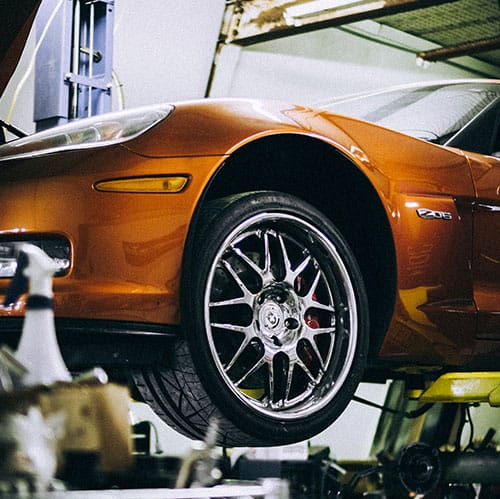Brake Pedal is Stiff to Push Inspection Service at
Your Home or Office

Why is the Brake Pedal Stiff / Hard To Push
The brake pedal allows you to have full control of the pressure that is applied to drive the brake when slowing down your car. However, the pedal may become stiff and difficult to apply. This may not necessary impede vehicular operation, but you want a hassle-free driving. So hiring a mechanic to inspect this problem is what you want.
The Brake System:
The brake system in modern cars is assisted by a brake booster for increased vacuum. A vacuum diaphragm helps to multiply the amount of force applied to the brake pedal, allowing you to control the brakes easier and faster. On depressing the brake pedal, the vacuum source is sealed off. This makes it possible for atmospheric pressure to enter the vacuum diaphragm in one side, causing the master cylinder pistons to apply the brakes. Once the foot is removed from the pedal, diaphragm vacuum is restored to both sides, and the master cylinder pistons assume their default position.
Note:
– The entire brake system will cease to operate with no anti-lock control if one ABS speed sensor fails. Your mechanic will usually be able to identify which, and how many sensors have failed after diagnosing the system.
– The Anti-lock brake system light automatically turns on and stays lit when the car’s ABS sensor fails.
– Losing the functionalities of your ABS system makes steering overly difficult, especially in emergency situations where brakes might be locked up and stopping distance increased.

Why Your Brake Pedal May Be Stiff:
-
Bad brake booster: The brake booster is likely to be the cause of a hard brake pedal. This happens when the brake booster is unable to help in vacuum production, ensuring you are left with no assistance when applying the brake pedal.
-
Leaking Vacuum hose: While a broken booster may be the culprit, it may also be that a single component is responsible for the problem. For example, a leaking vacuum hose will thwart vacuum assist when the brake is applied.
-
Faulty Check valve: If the check valve is damaged for any reason, you may also experience hard brake application, since this component controls the entry of air into the booster.
-
Wrong-size parts: In some cases, you may be running the wrong choice of parts, especially after a recent booster replacement. Hiring an inexperienced mechanic may save you repair fees, but this could be to the detriment of service and choice of vacuum hose or booster for your car, leading to brake pedal problems.

Getting started:
A professional mechanic will inspect all components of your braking system including the brake booster which is often the source of the problem. A full inspection will help your mechanic to provide a report stating the scope and cost of repairs to be made.
Why this service is important
Hard brakes may still work when depressed, but erring on the side of caution by having your car inspected is key for safe and hassle-free driving. Always hire a professional mechanic to diagnose your braking problems and get your car back to its optimal condition. Our expert mechanics are always ready to help. So book an inspection service with one today if you detect any problems with this system.

How it Works

Get A Quote

Book an Appointment

Get Your Car Fixed
Google Reviews
Our Mechanics Are Available In Over 20 Locations
We’re available across the Greater Toronto Area, and are expanding quickly.
Cities We Serve
- Brake Pedal Is Stiff Inspection Service in Downtown Toronto, ON
- Brake Pedal Is Stiff Inspection Service in North York, ON
- Brake Pedal Is Stiff Inspection Service in Mississauga, ON
- Brake Pedal Is Stiff Inspection Service in Richmond Hill, ON
- Brake Pedal Is Stiff Inspection Service in Ajax, ON
- Brake Pedal Is Stiff Inspection Service in Pickering, ON
- Brake Pedal Is Stiff Inspection Service in Markham, ON
- Brake Pedal Is Stiff Inspection Service in Scarborough, ON
- Brake Pedal Is Stiff Inspection Service in Etobicoke, ON
- Brake Pedal Is Stiff Inspection Service in Brampton, ON
More Specific Brake Pedal Is Stiff Inspection Estimates
- Mercedes-Benz Brake Pedal Is Stiff Inspection
- BMW Brake Pedal Is Stiff Inspection
- Acura Brake Pedal Is Stiff Inspection
- Nissan Brake Pedal Is Stiff Inspection
- Ford Brake Pedal Is Stiff Inspection
- Mazda Brake Pedal Is Stiff Inspection
- Hyundai Brake Pedal Is Stiff Inspection
- Honda Brake Pedal Is Stiff Inspection
- Toyota Brake Pedal Is Stiff Inspection
- Volkswagen Brake Pedal Is Stiff Inspection













